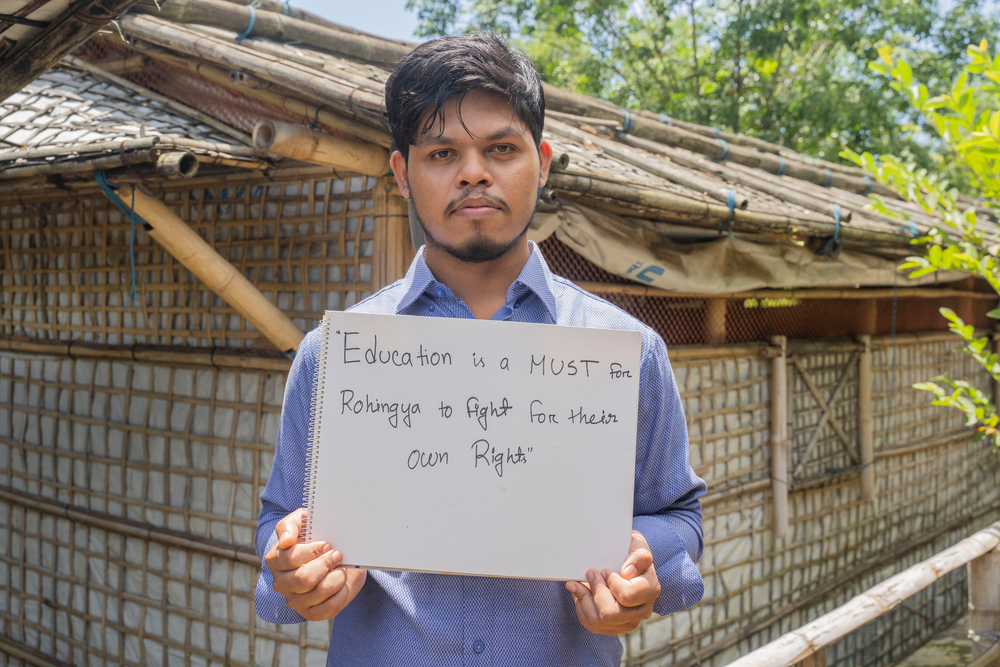To answer the call from Rohingya MSF volunteers

Hubaib is a young Rohingya man in his 20s. He used to be a student who aspired to become a lawyer in Rakhine state. Now, Hubaib works with MSF as a volunteer in Cox’s Bazar, Bangladesh. Countless Rohingyas, including Hubaib, have been surviving in the world’s largest refugee camp for the last five years.
I met him at Rubber Garden, one of the nine MSF facilities in Cox’s Bazar, along with other Rohingya volunteers who shared the challenges their communities faced in the camps where global attention to the crisis has been dwindling. As MSF volunteer staff, they have been supporting with health promotion activities and collecting information on the current needs in the camps.
I was part of the MSF delegation consisting of colleagues from Australia and Japan, and we had the opportunity to listen to the voices of the Rohingya volunteers through their presentations. They talked about different issues, including safety and security, water and sanitation, healthcare, education, and women’s empowerment. They all used the Rohingya language, but hints of English words like ‘violence’ and ‘security’ could intermittently be heard. I could tell that they prepared their presentations – infused with sincerity and compelling messages – with dedication, responsibility, and hope for nearly 1 million Rohingya refugees.
Hubaib, the youngest among the volunteers, focused on the issue of education. According to another MSF colleague who provided interpretations, Hubaib’s English proficiency was high, but he chose to use the Rohingya language for the presentation because he was a little bit shy. Hubaib’s voice was solid and clear, and he structured his presentation chronologically from 2017 to 2022 and presented the aggravating living conditions in the refugee camps. Towards the end of his presentation, Hubaib was not able to continue his words which led to a moment of silence. He bit his lips and his eyes started to become watery. He was quiet. However, I could see what he was feeling in the moment and how much he was trying to be calm while holding back waves of emotions. The other volunteers who have long been sharing a strong emotional bond with Hubaib were silently watching him, as did I.
Soon, with a slightly trembling voice, he muttered, “The label that we were provided, ’the most persecuted people in the world’, is not the title that the Rohingya people wanted to have.” This was a compelling message that was etched in my memory. He also powerfully and desperately called for more assistance for the Rohingya people so that they themselves can withdraw the title in the future.
After all the presentations were finished, we had a session for questions and answers for about an hour. We asked questions and they shared their first-hand experiences and testimonies about the dire living conditions in the camps. The myriad of Rohingya patients, children, parents, and elderly people could have never imagined themselves to be caught in the situation for five interminable years. Another Rohingya volunteer, Hamit, said he originally expected to stay in Cox’s Bazar for only a month. “I came here to stay for a month but five long years have passed. I am stuck here. When will we be able to return?”
At the end of the session, one of our colleagues from the delegation asked if any of the volunteers had a question for the delegation. Sana, the most senior Rohingya volunteer among them smiled at hearing this question. The beginning of his experience with MSF dates back to almost 17 years ago in Rakhine state. He worked with MSF in his homeland for 12 years, and “reunited” with MSF in Cox’s Bazar 5 years ago as a refugee. With the smile on his face, Sana gave us a wise answer to our simple question – “We already threw you a question.” And he continued, “We would like to hear from you now. We have given you all the information and shared everything we observed.” It meant that they already openly provided their testimonies, expecting significant responses to improve the conditions and realities in the camps.
Before we left Rubber Garden, a special photo session took place. Each Rohingya volunteer held a sign board with a message in front of a camera. Hubaib’s message was ‘Education is a MUST for the Rohingya to fight for their own rights.’ Subitara who presented on women’s empowerment held a message saying, ‘Without women’s empowerment, their protection cannot be ensured.’ Hamit and Anam delivered messages about repatriation and access to water respectively. And lastly, it was Sana, who held this message – “Humanitarian assistance should continue improving.”
Hubaib is a young Rohingya man in his 20s. He used to be a student who aspired to become a lawyer in Rakhine state. Now, Hubaib is a hardworking MSF volunteer who strongly raises his voice for himself and his people in collaboration with the other Rohingya volunteers and MSF fieldworkers. He says he has not seen any glimmer of hope in the refugee camps, but I would like to say that he himself is becoming a hope for the future. While this young man’s struggle in the camps goes on, MSF will commit to continue advocating for the Rohingya refugees and bring back answers to Sana’s question.
First-person piece of Tae-Eun Kim , MSF Korea Humanitarian Affairs Representative, based in Seoul, South Korea. She previously worked with the humanitarian assistance department at Korea International Cooperation Agency (KOICA). Tae-Eun holds a Ph.D. degree in socio-cultural anthropology





Leave a Comment